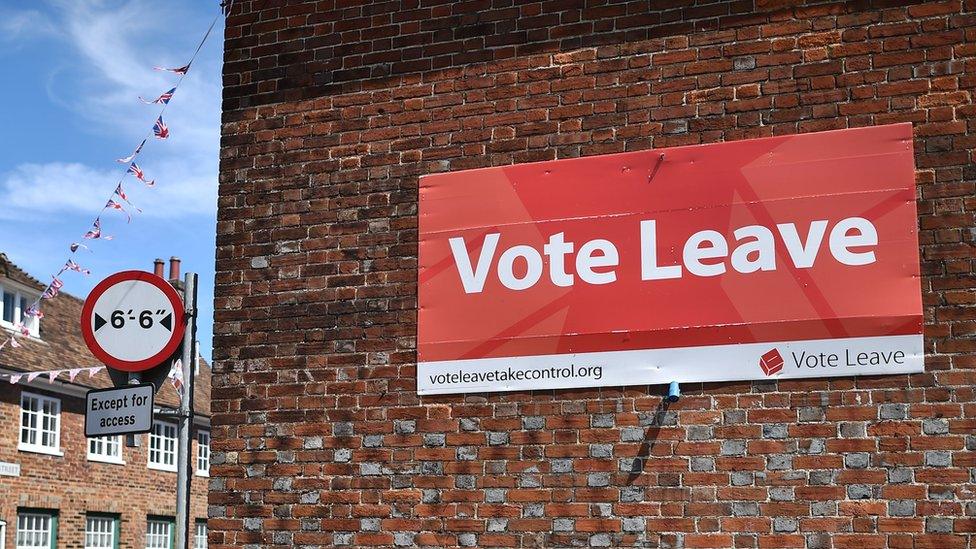Electoral Commission faces legal action over Vote Leave ruling
- Published

The Electoral Commission is facing possible legal action over its decision to drop an investigation into Vote Leave's Brexit campaign spending.
Vote Leave paid £625,000 to clear bills allegedly run up by a university student with a Canadian digital agency days ahead of last June's referendum.
The Electoral Commission says it has no grounds to suspect this was an illegal scheme to get round spending limits.
But a group of campaigning lawyers says the watchdog failed to do its job.
The Good Law Project, run by Jo Maugham QC, is attempting to secure a judicial review of the Commission's decision in the High Court.
The allegations centre on Darren Grimes, at the time a fashion student at the University of Brighton, who set up a group called BeLeave, to give young pro-Brexit campaigners a voice during last year's referendum.
'Acceptable method'
As a registered campaigner, Mr Grimes was allowed to spend up to £700,000. He initially spent very little but in the 10 days leading up to the 23 June vote he ran up a £675,315 bill with Aggregate IQ Data, a Canadian marketing firm that specialises in political campaigns, according to the Electoral Commission database, external.
Money to clear the bill was not given to Mr Grimes but sent directly to Aggregate IQ by Vote Leave, which separately spent £2.7m with the same firm, more than a third of its £6.8m budget.
Mr Grimes also received £50,000 from an individual Vote Leave donor in the final 10 days, making the previously obscure campaigner's group one of the best-funded at the referendum.
Campaign director Dominic Cummings is quoted on Aggregate IQ's website as saying "we couldn't have done it without them".

Darren Grimes ran the BeLeave campaign
In total, AIQ was given £3.5m by groups campaigning for Brexit, including Vote Leave, the Democratic Unionist Party and Veterans for Britain, which received a £100,000 donation from Vote Leave.
Vote Leave would have gone over its campaign spending limit if it had spent the money it donated on behalf of Mr Grimes itself.
The campaign group said it made the donation to Mr Grimes because it was coming up to its £7m spending limit and wanted a way of using £9.2m it had raised from individuals and companies on campaigning activities.
The Electoral Commission says this is an "acceptable method of donating under the rules". It only becomes a potential offence when there is evidence of a "common plan or arrangement" on how the money is spent, to prevent campaigns from setting up front groups to get round spending limits.
The watchdog says campaigners on the same side of the argument "can liaise and discuss campaigning approaches without meeting the threshold of joint spending within the meaning of the legislation".
And "after a detailed look at this matter" it did not find reasonable grounds to suspect an offence had been committed by Vote Leave or Mr Grimes.
'Wholly implausible'
But in a nine page "pre-action letter", external, threatening legal proceedings against the Electoral Commission, the Good Law Project claims the watchdog made an "error of law".
The project claims it is "wholly implausible," based on the evidence seen by the Electoral Commission, that Mr Grimes and Vote Leave did not work together.
Mr Grimes, who is now deputy editor of the Brexit Central website, external, did not respond to requests for a comment. He has previously said: "Vote Leave had no say or input in our strategy or our campaign spending."
Matthew Elliott, who was Vote Leave's chief executive and is now editor-at-large of Brexit Central, was not available for comment.
Mr Maugham, a former Labour Party member who campaigned for Remain in last year's referendum, insisted he was not motivated by a desire to undermine Brexit.
He said there was "no evidence one way or another" that the referendum might have turned out differently if Vote Leave had been prevented from donating to Mr Grimes.
But he said he was concerned that the Electoral Commission was "asleep on the job" and not fulfilling its role of preventing democracy from being "captured" by those with big money to spend.
"Too many of our regulatory agencies are managed and governed by people who are there because they will not rock the boat. I think it is a systemic problem," he added.
Investigations
An Electoral Commission spokesman said: "We assessed whether payments made to Aggregate IQ, by Vote Leave on behalf of Mr Grimes, was in fact spending with him under a 'common plan'.
"If it was, it should have been reported by Vote Leave as part of their spending and would have needed to be within their spending limit.
"However, the evidence we saw was consistent with these being donations to Mr Grimes, which he reported, and not spending under a common plan. Consequently we did not have grounds to investigate further.
"We have written to the Good Law Project explaining why in our view they have failed to provide any new, credible evidence that would call into question our decision."
In April, the Electoral Commission launched a separate investigation into spending during the referendum by Leave.EU, the campaign backed by then-UKIP leader Nigel Farage and donor Arron Banks.
It is also investigating spending by the anti-Brexit campaign Britain Stronger in Europe.
The Good Law Project has accused the watchdog of dragging its feet over the Leave.EU investigation and is demanding a statement on what stage it has reached and "reasons for the delay".